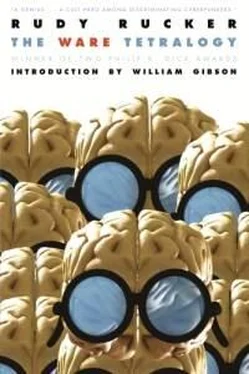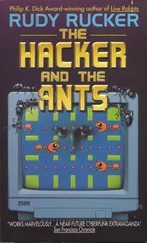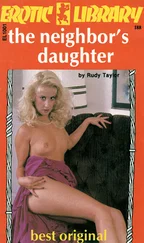Rudy Rucker - The Ware Tetralogy
Здесь есть возможность читать онлайн «Rudy Rucker - The Ware Tetralogy» весь текст электронной книги совершенно бесплатно (целиком полную версию без сокращений). В некоторых случаях можно слушать аудио, скачать через торрент в формате fb2 и присутствует краткое содержание. Год выпуска: 2010, Жанр: Киберпанк, на английском языке. Описание произведения, (предисловие) а так же отзывы посетителей доступны на портале библиотеки ЛибКат.
- Название:The Ware Tetralogy
- Автор:
- Жанр:
- Год:2010
- ISBN:нет данных
- Рейтинг книги:5 / 5. Голосов: 1
-
Избранное:Добавить в избранное
- Отзывы:
-
Ваша оценка:
- 100
- 1
- 2
- 3
- 4
- 5
The Ware Tetralogy: краткое содержание, описание и аннотация
Предлагаем к чтению аннотацию, описание, краткое содержание или предисловие (зависит от того, что написал сам автор книги «The Ware Tetralogy»). Если вы не нашли необходимую информацию о книге — напишите в комментариях, мы постараемся отыскать её.
The Ware Tetralogy — читать онлайн бесплатно полную книгу (весь текст) целиком
Ниже представлен текст книги, разбитый по страницам. Система сохранения места последней прочитанной страницы, позволяет с удобством читать онлайн бесплатно книгу «The Ware Tetralogy», без необходимости каждый раз заново искать на чём Вы остановились. Поставьте закладку, и сможете в любой момент перейти на страницу, на которой закончили чтение.
Интервал:
Закладка:
Da dead. Phil groaned and got out of bed, sliding the groan down into a keening moan. This hurt so much that he needed to keep making noise.
He wore only a plain white T-shirt. His butt was small, his legs were short and nimble. Phil’s mother Eve was Greek, while his father Kurt had been German. Phil’s body hair and chin-stubble were dark, but the hair on his head was a floppy shock of blond. His sly, hooded eyes and sardonic lips made him look dissipated, which was misleading. Phil had been clean and sober his whole life. When the mandatory grade-school screening had revealed that Phil carried the genes for alcoholism and drug addiction, Phil had taken it to heart and decided to spend his life Straight Edge. A singularly mature decision for one so young—with the bonus of providing a way to be superior to Da, who’d been quite fond of booze and pot.
Phil’s room was bright and messy, an odd-shaped room with a peaked ceiling and walls that slanted out on two sides. There was a lot of empty space near the ceiling, and Phil had some home-built robot blimps cruising around up there like sluggish tropical fish. Flying machines of all kinds were Phil’s hobby. The blimps were like pets, and Phil had names for them: one was Led Zep of course, the others were the Graf Z, the Macon, the Penile Implant, and the largest and most colorful was the Uffin’ Wowo. The last name was a riff on Da’s brilliant uvvy graphic that had somehow ended in disaster less than an hour ago. Da dead. Life ends in tears.
Distractedly humming, Phil put on some thick red tights he’d gotten from the thrift store. There was gray morning light from the room’s skylight. Kevvie sat on a rolling desk chair, chewing e-gum and watching him.
Phil swung open his room’s arched mouse-hole door to reveal the interior of what looked like a factory. His room was located inside a bigger room, that is, Phil’s room was a wooden box on stilts inside a subdivided warehouse down near the bay-side Port of San Francisco. Some developer had sliced the giant warehouse up into five or six strips, and Phil rented one of the strips along with two other people: a guy called Derek and a woman named Calla. Derek was a chaos artist and Calla a genetic counselor, while Phil was a cook in an expensive restaurant. Each of the three lived in their own cobbled-together wooden box.
Phil’s and Calla’s boxes were on stilts, and Derek’s hung by cables from the ceiling. The huge open warehouse floor was left free and clear for other purposes. The three boxes were a bit like birdhouses in an aviary—quite literally so in the case of Phil’s, as he’d designed his dwelling from the specs for a traditional pentagonal wren-house like a kid might bring home from shop class. He’d tried giving his room a round door, but after tripping over the curved threshold a few times, he’d compromised and made the door’s bottom square and flush with his box’s floor.
Phil started down his thin little chicken-walk of a staircase. He could see out the windows that lined the tops of the warehouse’s walls: a view of the San Francisco Bay, of a floating gray ship and a docked red ship, of great four-legged cranes like giraffes or elephants, of concrete dockside elevators, of more warehouses beneath low clouds. Everything chilled and dismal. A Thursday in February.
High overhead hung a giant twisting model of DNA; this was Calla’s. It was made of linked spheres that were hollow cocoons spun by a fabricant, a little DIM ant that could turn sunlight and wet leaves into filaments of rayon. The DNA model was a useful thing for Calla to show to her clients, who came here in person when the genetic information that Calla gave them was so harsh or so strange that uvvy contact wasn’t enough. Phil well remembered when his genetic counselor had laid out his options: abstinence or addiction.
Down on the factory floor, two of Derek’s “attractors” were active. One looked like a big wobbly green doughnut, the other like a purple cow-udder with twisting teats. They were patterns of air currents, flowing volumes of air made visible by color-lit fogs of vapor, fractally rich with eddies and schlieren. A dozen other attractor-devices sat idle: cryptic, mute technoclutter. Only when the attractors were powered up did they clothe themselves in beautiful, orderly chaos. Da’s wowo had been a similar kind of thing.
Phil took a shortcut through the doughnut volume, careful not to bang into the machinery at its core. But he stepped on something anyway, something that yipped. Derek’s mutt Umberto. The dog sometimes liked to sleep hidden inside the doughnut, warmed by the central generator.
“Hush, Umberto,” said Phil. “It’s okay.” If only that were true.
In the bathroom, Phil drank some water. The water on his teeth like a mountain stream. Da dead? It was way too soon. There was still too much to say to the old man, too much to learn. Now the tears were beginning to come. A rough sob. He buried his face in a towel.
After a bit, Phil washed off his face with cold water, then cried some more and washed some more. The beautiful complexity of water, of its sounds and motions. Da wouldn’t see water anymore. Phil’s dream just before waking—he’d been climbing the teeth-mountains and—hadn’t there been a ball of light in the dream? Phil leaned on the sink, resting his forehead against the mirror with his eyes closed, trying to look back into his dream. Wouldn’t it make sense to have had a special dream just as his father died? Especially when Da had died so strangely.
“Here’s some coffee,” said Kevvie, who’d followed him as far as the kitchen—the little area of the factory floor that passed for a kitchen, a sink and a stove and a table with chairs on the concrete floor beneath the seventy-foot-high truss-supported corrugated steel ceiling. She’d brought the uvvy as well. “Get away, Umberto,” she said, and aimed a sharp kick at the dog, who’d come over to see if he might get some breakfast. Kevvie couldn’t stand Umberto.
“Don’t hurt him, Kevvie.” Phil took the coffee. “Thanks. I can’t believe this. I feel so—it’s like my head’s exploding. Life’s not a rehearsal. It’s real.” He took the coffee Kevvie handed him, but set it down without drinking.
“You better call Willow,” said Kevvie. She glared at Umberto so hard that the dog went slinking away.
“I know.” Phil told the uvvy to dial his stepmother Willow. Phil’s father Kurt had left Phil and Jane’s mother Eve for Willow when Phil was thirteen and Jane was eleven. Eve had successfully remarried, and the families had stayed reasonably close over the years, with Phil and Jane freely moving between the households of their two biological parents.
Willow answered on the second ring. “Willow Chen Gottner,” her voice was loud and harsh, just short of a scream. Willow’s image floated above the uvvy—she was a thoroughly Californian Chinese woman with a symmetric face, full lips, and blonde hair so shiny and processed that it looked like metal. She moved with abrupt, birdlike gestures. There were smears of blood on her hands and on her cheeks. Her normally tidy features were blurred and twisted with anguish.
“Hi, Willow, it’s Phil. I just talked to Jane.”
“Kurt’s really dead, yes, this is his blood all over me. I’m so scared, Phil. The wowo ate him like garbage.”
“I’m coming right down. Where are you?”
“I’m at the popos’ station. They don’t know what the fuck I’m talking about. They think I murdered Kurt or some shit.” Willow was notoriously foul-mouthed. This was something that Phil and Jane’s mother always tut-tutted over, but it made Phil and Jane like Willow more than they might have otherwise.
“You see!” interjected Kevvie. “Tell her to get a top criminal attorney!”
Читать дальшеИнтервал:
Закладка:
Похожие книги на «The Ware Tetralogy»
Представляем Вашему вниманию похожие книги на «The Ware Tetralogy» списком для выбора. Мы отобрали схожую по названию и смыслу литературу в надежде предоставить читателям больше вариантов отыскать новые, интересные, ещё непрочитанные произведения.
Обсуждение, отзывы о книге «The Ware Tetralogy» и просто собственные мнения читателей. Оставьте ваши комментарии, напишите, что Вы думаете о произведении, его смысле или главных героях. Укажите что конкретно понравилось, а что нет, и почему Вы так считаете.











